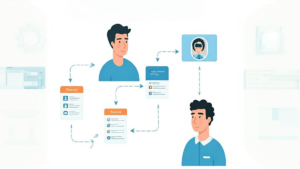
Artificial Intelligence (AI) has revolutionized many aspects of the business world, and CRM (Customer Relationship Management) is no exception. The integration of artificial intelligence into CRM systems is transforming the way companies manage their customer relationships, optimize processes, and improve the customer experience. In this blog, we will explore how AI is changing CRM, from task automation to large-scale personalization, and how you can take advantage of these advancements in your business.
What is Artificial Intelligence in the Context of CRM?
Before delving into its benefits, it is important to understand what artificial intelligence in CRM means. AI, in this context, refers to the use of advanced algorithms and machine learning to analyze large amounts of data and make smarter, more automated decisions. AI enables CRM systems to go beyond data storage and organization, helping companies predict behaviors, automate processes, and personalize the customer experience.
A study by Salesforce revealed that 57% of companies are already using artificial intelligence in their CRM strategies, and this number is expected to continue growing in the coming years. AI in CRM not only improves efficiency, but also helps companies respond more quickly and accurately to their customers’ needs.
Automation of Routine Tasks
One of the biggest benefits of integrating artificial intelligence into CRM is the ability to automate routine tasks. AI can handle repetitive tasks such as data entry, updating customer information, and managing follow-ups, freeing up time for sales and customer service teams to focus on more strategic interactions.
For example, a CRM with AI can automate the sending of follow-up emails when a potential customer has visited certain web pages or shown interest in specific products. A McKinsey report indicates that companies that automate these tasks with AI experience a 15-20% increase in sales team productivity. By reducing manual workloads, AI not only improves efficiency, but also minimizes human errors, resulting in a more accurate and faster service.
Improvements in Personalization and Customer Segmentation
Personalization is key to building strong relationships with customers, and artificial intelligence takes this personalization to a completely new level. With AI, CRMs can analyze large volumes of data in real time, allowing better customer segmentation and offering highly relevant content and offers.
For example, AI can analyze a customer’s purchase history, past interactions, and online behavior to predict their future needs. Based on this analysis, the CRM can recommend personalized products or services, send offers at the right time, or adjust marketing strategies according to the individual preferences of the customer. An Accenture study reveals that 91% of consumers are more likely to buy from brands that offer relevant offers and recommendations. AI in CRM makes this large-scale personalization possible, improving the customer experience and increasing conversion rates.
Behavior Prediction and Predictive Analytics
One of the most powerful capabilities of AI in CRM is its ability to predict future customer behavior. Machine learning algorithms can analyze past and present patterns to predict which customers are more likely to buy again, abandon the brand, or need additional support. This predictive analysis allows companies to anticipate customer needs and take proactive measures.
For example, a CRM with AI can predict which customers are at risk of abandoning the brand by analyzing key indicators such as reduced interactions or lack of repeat purchases. With this information, the sales or marketing team can proactively intervene by sending personalized offers or adjusting the communication strategy. A Forrester study shows that companies using AI for predictive analytics achieve a 23% improvement in customer retention.
Prediction can also be applied to inventory planning or price optimization, allowing companies to adjust their strategies in real time and increase customer satisfaction.
Improving Customer Service with Chatbots and Virtual Assistants
Chatbots and virtual assistants are another powerful tool that AI brings to CRM. These assistants can handle customer inquiries in real time, offering quick responses and solving common problems without the need for human intervention. They are also available 24 hours a day, which significantly improves the customer experience by providing immediate support.
For example, an AI-powered chatbot can help customers track their orders, resolve product-related questions, or guide them through a purchase process, all automatically and without the need to wait for a human agent. A report from Juniper Research estimates that by 2023, chatbots will save companies more than $8 billion annually in customer service costs. By offering fast and efficient support, chatbots not only improve customer satisfaction but also reduce operational costs.
Sentiment Analysis and Customer Understanding
Artificial intelligence also enables CRMs to analyze customer sentiment based on their interactions, such as emails, social media comments, and support calls. Sentiment analysis uses algorithms to determine if a customer is satisfied, frustrated, or dissatisfied, allowing companies to adjust their approach based on these emotions.
For example, if sentiment analysis detects that a customer has left repeated negative comments on social media, the CRM can alert the customer service team to take action and resolve the situation before it becomes a bigger issue. A Gartner study reveals that companies using sentiment analysis improve customer satisfaction by 15%. By better understanding customers’ emotions and perceptions, companies can act proactively to improve the customer experience.
Sales Process Optimization
Artificial intelligence is helping companies optimize their sales processes more intelligently. AI-powered CRMs can analyze past sales data, identify cross-selling and upselling opportunities, and automatically assign follow-up tasks to the most suitable sales representatives. This not only improves the efficiency of the sales team but also increases closing rates.
For example, AI can identify patterns in customers who have purchased specific products and suggest additional complementary products. It can also prioritize leads with higher conversion probabilities, helping salespeople focus their efforts on the best opportunities. According to a Harvard Business Review study, companies using AI in their sales strategies see a 50% increase in sales team productivity.
Simple Implementation and Scalability
One of the advantages of AI-powered CRMs is that many of these tools are designed to be easily integrated into existing CRM platforms. This allows companies to start using AI quickly without the need for a costly or complex implementation. Additionally, scalability is a great advantage. As your business grows, AI can adapt to demand, processing increasingly larger volumes of data without compromising performance.
For example, if your company experiences a sudden increase in the number of customers and data it manages, an AI-powered CRM can automatically adapt to handle this growth without losing efficiency. A PwC study indicates that companies integrating AI into their CRM processes achieve 30% more efficient operational scalability. AI not only optimizes current operations but also ensures that the company can grow without facing technological barriers.
Conclusion
Artificial intelligence is transforming CRM, allowing companies to better manage their customer relationships, optimize sales processes, and improve personalization on a large scale. From task automation to predictive analytics and improvements in customer service, AI is providing powerful new tools that allow companies to be more efficient and better respond to their customers’ needs.
As more companies adopt these technologies, we will see a significant change in how customer relationships are managed, resulting in more satisfactory and personalized experiences. Implementing an AI-powered CRM is no longer an option just for large corporations but a necessity for any company that wants to remain competitive in an ever-evolving market.






No comment yet, add your voice below!